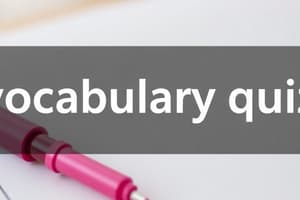Podcast
Questions and Answers
Match the following spelling aid with its description:
Match the following spelling aid with its description:
Context = Understanding the meaning of words in sentence context to remember spellings better Etymology = Exploring the origins of words to provide clues for their spelling Mnemonics = Creating simple tricks to aid in recalling spellings Root words = Understanding the base words to better grasp spelling and meaning
Match the following examples with their respective categories:
Match the following examples with their respective categories:
Criteria = Word whose spelling clues can be found in its Greek origin Hiccough = Word with an obsolete origin that affects its spelling Weird, Behind, Receive = Words following the 'I before E except after C' rule with exceptions Science, Defense = Words that break the 'I before E except after C' rule
Match the following mnemonic rule with its correct application:
Match the following mnemonic rule with its correct application:
I before E except after C = Rule applicable to words like 'weird' and 'receive' Exceptions like 'science' and 'defense' = Instances where the 'I before E except after C' rule does not apply Mnemonic for tricky spellings = Simple trick to remember spellings like 'weird' and 'receive' Clues from word origins = Guidance from Greek origin as in the word 'criteria'
Match the following vocabulary-enhancing techniques with their benefits:
Match the following vocabulary-enhancing techniques with their benefits:
Match the following spelling rules with their descriptions:
Match the following spelling rules with their descriptions:
Match the following terms with their meanings:
Match the following terms with their meanings:
Match the following examples with the correct spelling rule they demonstrate:
Match the following examples with the correct spelling rule they demonstrate:
Match the following terms with their correct examples:
Match the following terms with their correct examples:
Match the following prefixes with their effects on words:
Match the following prefixes with their effects on words:
Match the following terms with their related concepts:
Match the following terms with their related concepts:
Flashcards are hidden until you start studying
Study Notes
P2 Spelling Quiz 3: Mastering Vocabulary and Spelling Rules
Spring 2024 is bringing a new challenge to the language-loving students of P2: a spelling quiz that delves into both vocabulary and spelling rules, ensuring your skills are up to par. In this article, we'll explore the key concepts you'll need to know to crush this quiz.
Vocabulary
Expanding your vocabulary is a critical aspect of excelling in spelling. The more you know about words and how they're used, the better you'll be able to remember their spellings.
-
Context: Understanding the meaning of words in sentence context will help you to remember the spelling better. For instance, "exceed" and "extreme" may look similar, but their meanings are distinct, which can help you recall their spellings.
-
Etymology: The origins of words can provide clues to their spelling. For example, "criteria" comes from the Greek word "krisis," which means "judgment," and "hiccough" comes from "hiccuck," a now-obsolete word related to "hiccup."
-
Mnemonics: Devise simple tricks to recall spellings. For instance, "I before E except after C" is a timeless rule for "weird," "behind," and "receive," but remember that there are exceptions like "science" and "defense."
-
Root words: Understand the root words of words, and you'll better understand the word's spelling and meaning. For example, "educate" comes from the Latin root "ducere," meaning "to lead," and "intricate" comes from the Latin root "intricatus," meaning "interlaced."
Spelling Rules
Mastering spelling rules is essential for improving your spelling skills.
-
Pluralization: Learn when to add an "s" and when to change the base word. For instance, "dog" becomes "dogs," but "foot" becomes "feet."
-
Doubling consonants: Double the consonants before adding suffixes like "-er" and "-est." For example, "hop" becomes "hopper," and "fast" becomes "fastest."
-
Words ending in -y: Change the "y" to "i" before adding suffixes that begin with a vowel. For instance, "happy" becomes "happier," but "crying" becomes "cryingly."
-
Double consonants: Double the consonant after a single vowel before adding suffixes like "-ed" and "-er." For example, "love" becomes "loved," and "jump" becomes "jumper."
-
Suffixes: Learn to recognize irregular suffixes, such as "-th" in "bath" and "-d" in "fed," and memorize them.
-
Homophones: Distinguish between words that sound the same but have different spellings and meanings. For example, "there" and "their" have the same pronunciation but different spellings and meanings.
-
Prefixes: Learn to recognize and apply common prefixes like "un-" and "--less" to understand spelling changes in words. For example, "unhappy" and "happiness" have different spellings due to the prefix.
Mastering vocabulary and spelling rules will help you improve your performance in the P2 Spelling Quiz 3. With consistent practice and a growth mindset, you'll be well on your way to acing the test and enhancing your language skills. After all, the more you learn, the more you'll want to learn, creating a virtuous cycle of knowledge acquisition!
Studying That Suits You
Use AI to generate personalized quizzes and flashcards to suit your learning preferences.





